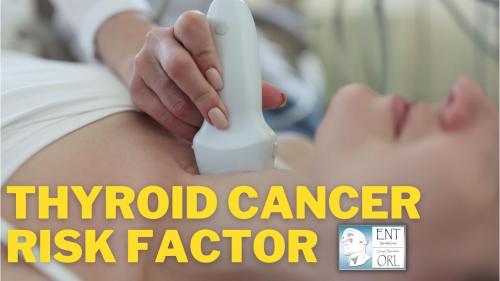Thyroid Cancer Risk Factors

A risk factor for thyroid cancer is a condition, behavior, or other part of your life that increases the likelihood of developing the disease.
It is important to understand if you have any risk factors for developing thyroid cancer to help your doctors develop a course of treatment that will be the most beneficial for you.
According to some thyroid cancer specialists, it can be a combination of environmental and genetic factors, which may cause thyroid cancer.
There are some people who will not show any signs or have symptoms. And others may see or feel a lump in their neck region. Doctors recommend treatments that treat thyroid cancer at its core. Those are hormonal therapy, radioactive iodine, surgery, radiation, and chemotherapy if the matter worsens.
What about the risk factors:
A risk factor is mainly determined by those stages, which will improve your chances of becoming a victim of thyroid cancer. Keeping a check on thyroid cancer risk factors is important. It will not only prevent you from getting cancer but will further help you to know if you have thyroid cancer from its initial stages.
There are certain risk factors, which you can change, like smoking. But then there are other risk factors, which you cannot control, like family history, age, and more. If you have family members who have suffered from thyroid cancer, then you may have a higher chance of getting it as well!
You should remember that just having the risk factors does not mean that you will end up having the disease or getting you infected. Most people with the disease will have few or even no known risk factors at all. According to scientific researches, scientists came up with some risk factors, and here are several of them.
Family history:
If you have a first-degree relative who has had thyroid cancer, then that increases your chances of developing thyroid cancer. Scientists have yet to discover the genetic basis behind it, and the research continues.
Hereditary conditions:
There are hereditary conditions, that are associated with thyroid cancer.
· Familial adenomatous polyposis:
Patients start to develop polyps called adenomas. These polyps tend to grow in the lining of the colon and rectum. These patients can also suffer from other types of thyroid cancers such as papillary thyroid cancer. Patients can also suffer from a FAP subtype, known as Gardner syndrome, where they get certain benign tumors.
· Medullary thyroid cancer:
Medullary thyroid cancer is the result of an abnormal inherited gene. Also known as familial medullary thyroid carcinoma (FMTC), this can be a standalone carcinoma or be found with other tumors.
Multiple endocrine neoplasia type 2 (MEN2) is caused by an inherited mutation in the RET gene. Most people with MEN2 will develop medullary thyroid cancer. MEN2 can cause other types of tumors. There are two sub-categories, MEN 2a and MEN 2b.
· Other forms of thyroid cancers:
There are several other types of hereditary cancers, such as:
· Cowden syndrome – caused by mutation of the PTEN gene which causes non-cancerous growths in the thyroid.
· Carney complex – is a very rare hereditary that may cause light brown spots on the skin. It increases the risk of tumors growing in the endocrine glands, including the thyroid.
Gender and age:
Thyroid cancer is more prevalent in women than men. Women suffer from thyroid cancer 3 times more than men. And more so during the reproductive years. The highest number of women diagnosed with thyroid cancer are between the ages of 44 and 49 years. Men are more likely to develop thyroid cancer at an older age.
The reasons for this are still unclear. Researchers are looking at the relationship between thyroid cancer and:
· pregnancy
· the use of oral contraceptives
· hormone replacement therapy
· the age periods start
· the age of menopause
Get hold of the best doctor:
No matter what your risk factor is, if you suspect that you might have cancer or have the slightest symptoms, make an appointment thyroid cancer specialist. When thyroid cancer is identified and treated at an early stage, the prognosis is excellent. This is especially true for people diagnosed with papillary and follicular thyroid cancer.
Post Your Ad Here
Comments